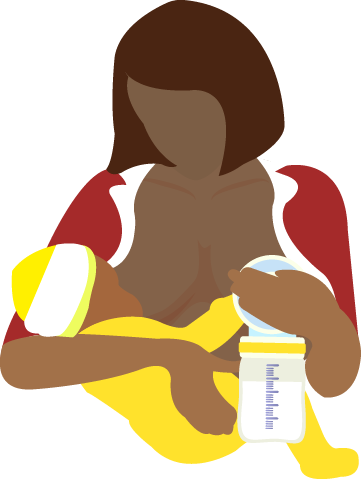
It is widely accepted that human milk is best for an infant. The benefits are substantial for the baby, providing the ideal nutrition, antibodies to protect against illness, and a healthy weight. There are benefits for mom, too: it increases bonding and relaxation, can be a cost-saver, and provides health benefits like a lowered risk of breast and ovarian cancers.
Exclusive breastfeeding is recommended for at least 6 months by most experts, and extended to 12 months while introducing other foods. However, many mothers will need to take medications of some type during breastfeeding, whether it be short-term for a sore back or a runny nose, or longer-term for a chronic condition like high blood pressure. This may raise questions about the safety of common treatments while nursing. Even though you’re a new mom with new responsibilities, your health still matters, too.
Although many drugs are safe to use when you’re breastfeeding, most will get into your milk to some degree and may even affect your milk supply. To be safe, check with your pediatrician before taking any kind of prescription or over-the-counter medication, herbal or dietary supplement, or vitamin. Even herbal teas may contain ephedra or other harmful ingredients. Just because a label says “natural” does not always mean it’s safe.
Breastfeeding and Medication Tips
The American Academy of Pediatrics states that many effects of medications on breastfeeding babies simply are not known. Due to this, only take a medication when absolutely needed, at the lowest dose and for the shortest time possible.
When possible, take medications that are given only once a day right after a feeding when your baby will have the longest period without nursing; for many women this is the last feeding of the night before the infant’s bedtime.
Watch your baby for side effects such as sleepiness, irritability, other potential or known reactions of the medication.
Avoid long-acting (LA), extended-release (ER), and combination forms of medications, when possible. Shorter-acting medications are elimninated from your body more quickly, and single medications give you greater flexibility in dosing.
Special precautions may be needed in preterm (premature) infants, due to their size and organ systems that are even less developed than a regular term infant.
Ask your doctor about the risks and benefits of any medication prescribed while you are breastfeeding, or any medication you choose from OTC options that do not require a prescription.
When more than one medication or a combination medication is used, follow the breastfeeding recommendations for the most problematic medication.
The information provided is taken from a reference source. It is provided as a guideline. No responsibility can be taken by Nyonyesha Foundation for the way in which the information is used. The data presented here is intended to provide some immediate information but cannot replace input from medical professionals.
Source: https://www.drugs.com/drug-safety-breastfeeding.html




